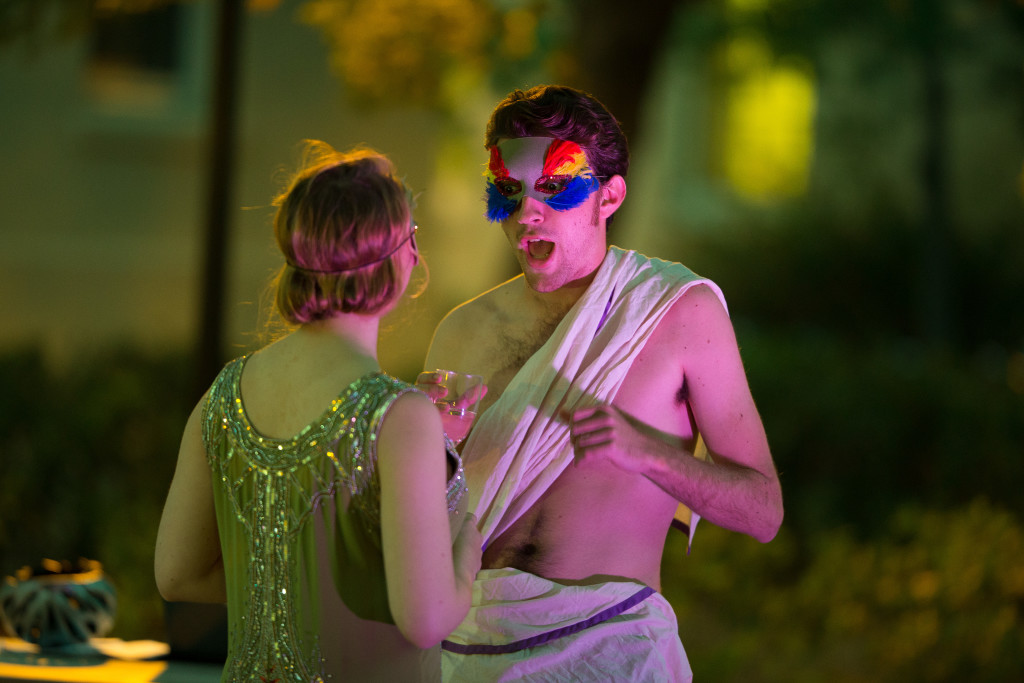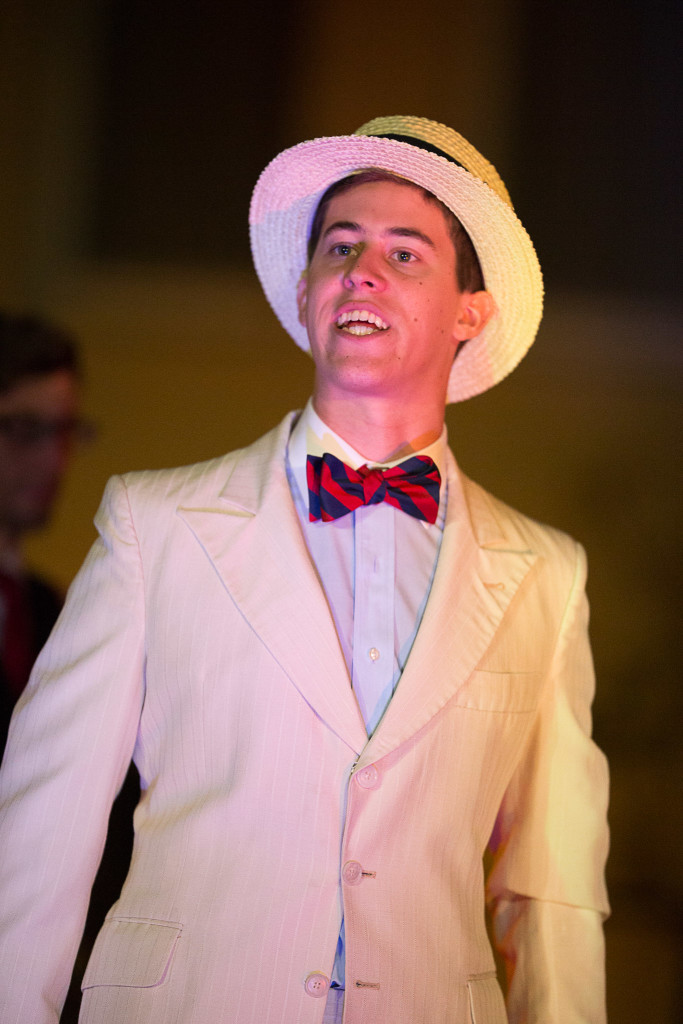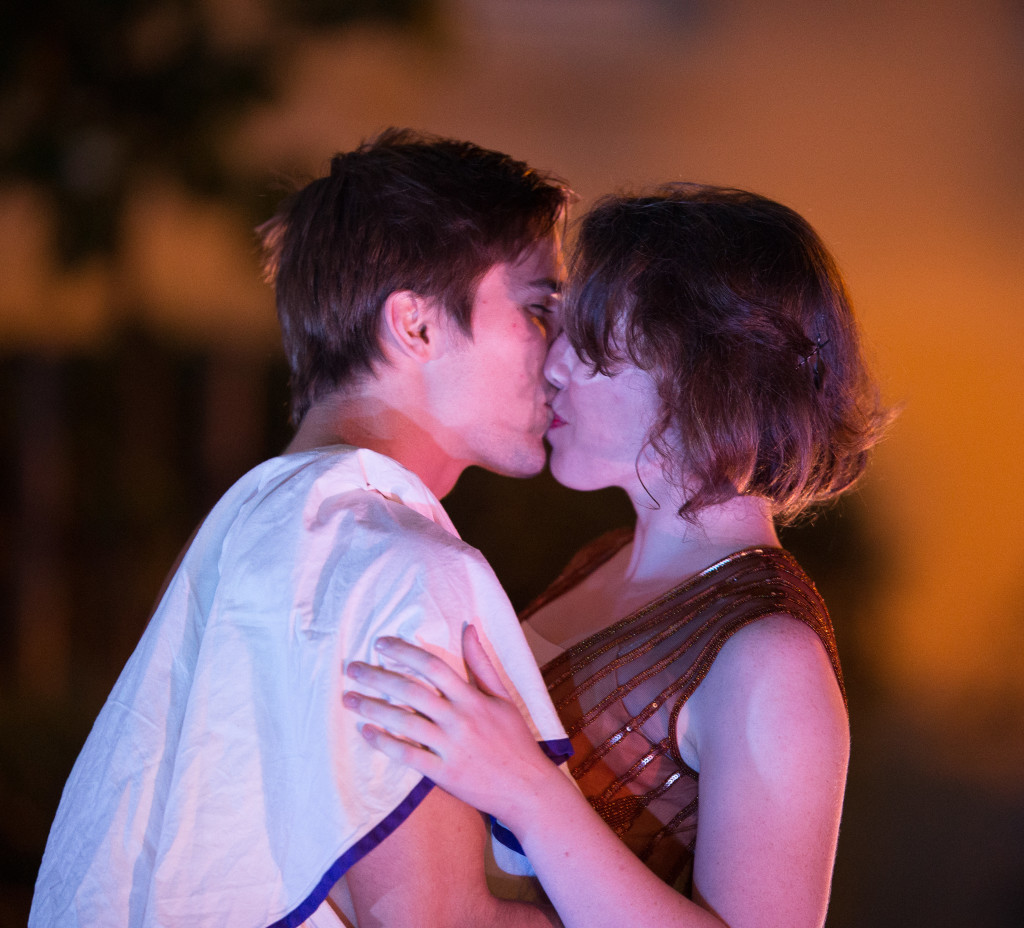 The Stanford Shakespeare Company’s production of Much Ado About Nothing is like the champagne (Assuming it was champagne and not flute-fulls of vodka) that flowed abundantly in Andrew Whipple’s staging-glittery, lovestruck, and refreshing. Shakespeare’s mid-career comedy ostensibly tells of Count Claudio’s (Zachary Damman ’18) love for Hero (Heather Connelly ’18), but their love story is hardly central. Claudio and Hero provide the cause-and-effect latticework through which we see the play’s actual romance: the one between Beatrice (Jackie Emerson ’17) and Benedick (Matthew Libby ’17). Most productions of Much Ado acknowledge this by casting their biggest stars as the witty duo. Recent productions have seen Alexis Denisoff-Amy Acker (Joss Whedon’s 2012 film), David Tennant-Catherine Tate (Josie Rourke’s 2011 production), and Kenneth Branagh-Emma Thompson (1993) as the sharp-tongued lovers.
The Stanford Shakespeare Company’s production of Much Ado About Nothing is like the champagne (Assuming it was champagne and not flute-fulls of vodka) that flowed abundantly in Andrew Whipple’s staging-glittery, lovestruck, and refreshing. Shakespeare’s mid-career comedy ostensibly tells of Count Claudio’s (Zachary Damman ’18) love for Hero (Heather Connelly ’18), but their love story is hardly central. Claudio and Hero provide the cause-and-effect latticework through which we see the play’s actual romance: the one between Beatrice (Jackie Emerson ’17) and Benedick (Matthew Libby ’17). Most productions of Much Ado acknowledge this by casting their biggest stars as the witty duo. Recent productions have seen Alexis Denisoff-Amy Acker (Joss Whedon’s 2012 film), David Tennant-Catherine Tate (Josie Rourke’s 2011 production), and Kenneth Branagh-Emma Thompson (1993) as the sharp-tongued lovers.
As plot goes, Much Ado doesn’t deviate from the Shakespearean norm: Take a couple developing romances. Slip in a mistaken identity, fake deaths, and a meddlesome friar. Some malapropisms, alcohol, and music turns this into most any Shakespearean comedy-but that’s Much Ado. However, Whipple’s gleaming, airy vision and the actors’ affection for their material makes for an enchanting experience. As viewers of comedies, we come in with a desire to be seduced by the fiction. And StanShakes seduces like no other. We sit on the grassy lawn as dusk creeps in overhead, and a 1920s garden party emerges -all fringed skirts and glitter. Count Claudio wants Hero, Don Pedro wants to matchmake, and Beatrice and Benedick want each other. Much Ado’s minimalist production design allows the beholder’s fancies to take off. A picnic bench, a bathroom window and a hole in the ground flicker and change under popsicle lights to become gardens, bedchambers and churches. The actors’ energy infuses the space-Emerson and Libby, in a set of scenes delightfully blocked by Whipple, crash and tumble all over the woodchips and into the audience. The spell is cast. Sitting in a fairy ring bound by lights instead of toadstools, I enter the enchantment.

The magicians working Shakespeare’s charms are phenomenal. Louis McWilliams ’16 delights in a turn as strutting, bumbling, creepily-matchmaking Don Pedro. McWilliams’ technique is magisterial, I’d advise readers to watch him in everything they possibly can. Much Ado‘s cohort of very attractive evil women features Melanie Arnold ’16 as Don Pedro’s illegitimate sister, Don John. Nora Tjossem ’15 as Borachio seduces and repents her way through yet another gender-bent appearance for The Stanford Shakespeare Company. Their gleefully evil machinations left me wishing for a spin-off starring Arnold and Tjossem. The City Watch, or Dogberry and the Dudes, ably essayed by Patrick O’Hare ’17, Sunny Huang ’14, Ellie Oates ’14, and Malaika Murphy-Sierra ‘.. deliver their scenes with earnest energy occasionally edging towards melodrama. As with the plot, though, Emerson and Libby carry the show. From their first instant of verbal sparring to the emotionally-charged “Kill Claudio” scene, Emerson and Libby depict Beadick (their couple name on the program) with energy, flair, and a raw honesty that surfaces in their monologues. As the play progresses, Beatrice and Benedick slowly shed their protective armours of “merry wit,” which makes their confession scene vulnerable and intimate. And eminently relatable. Hiding real feelings behind ironic uniforms of cynicism and humour is something our generation does well. In some sense, Beatrice and Benedick are Shakespeare’s most 21st-century couple.
Among the few downsides of the production was the fact that it remained unclear whether Tjossem and Arnold were playing women or men named Don John and Borachio. If, as their costumes suggested, they were, indeed women, it should be noted (hah!) that not only did Hero ‘cheat’ in Claudio and Don Pedro’s eyes, but she cheated with a woman. Does that matter to Claudio? Would it have changed things in any way?

Go watch Much Ado About Nothing this weekend. Go for McWilliams, Emerson, and Libby. Go for the vintage Shakespeare wordplay, the costumes, and the ridiculous 20s versions of the Top Hits of 2014. Go for the cohort of very attractive evil women. But mostly go watch it if you’ve ever loved and been loved.
Images courtesy of Frank Chen
